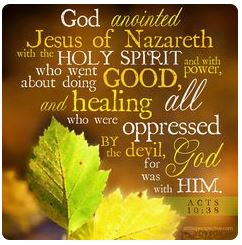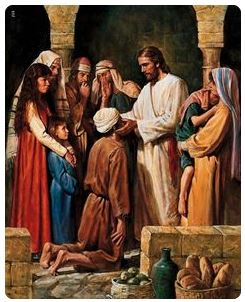The Great Physician now is near,
The sympathising Jesus;
He speaks the drooping heart to cheer,
Oh heard the voice of Jesus.
Refrain:
Sweetest note in seraph song,
Sweetest name on mortal tongue;
Sweetest carol ever sung,
Jesus, blessed Jesus. (William Hunter, c.1870)
One of the well-known portions of the New Testament is the Sermon on the Mount (also called The Constitution of the Kingdom), found in Matthew chapters 5 to 7. It is preceded by a summary of the early ministry of Jesus. “And he went throughout all Galilee, teaching in their synagogues and proclaiming [preaching] the gospel of the kingdom and healing every disease and every affliction among the people. So his fame spread throughout all Syria, and they brought him all the sick, those afflicted with various diseases and pains, those oppressed by demons, epileptics, and paralytics, and he healed them“ (Matthew 4:23-24 ESV).
The Sermon on the Mount reveals the primary importance of being right with God, and is followed by two chapters with individual incidents of healing in Matthew chapters 8 and 9. In these chapters we are given lessons in divine healing by the Great Physician. We could call these chapters The Contribution of the Kingdom: meeting the needs of the people, finding a hurt and healing it.
First, let’s spend a few moments in the summary at the end of chapter 4. Three words stand out: teaching, preaching, healing. This pattern is repeated throughout his ministry. The three actions are identical in order in Matthew 9:35 also. Teaching and preaching prepare the people to receive healing. As one writer said, “All teaching is telling, all preaching is yelling!” Of course, only a teacher like myself would see that distinction.

When Peter preached in Cornelius’ house in Caesarea in Acts 10, he said: “You yourselves know… how God anointed Jesus of Nazareth with the Holy Spirit and with power. He went about doing good and healing all who were oppressed by the devil, for God was with him” (Acts 10:37,38). In spite of the “cessationists” who say that it is not for today, the church universal has a great history of “doing good,” of teaching, preaching, and healing, following the example of Jesus. Oral Roberts often preached from chapter 8, declaring it the greatest healing chapter in the Bible. So let’s look at the first lesson.
“When he came down from the mountain, great crowds followed him. And behold, a leper came to him and knelt before him, saying, ‘Lord, if you will, you can make me clean.’ And Jesus stretched out his hand and touched him, saying, ‘I will; be clean.’ And immediately his leprosy was cleansed. And Jesus said to him, ‘See that you say nothing to anyone, but go, show yourself to the priest and offer the gift that Moses commanded, for a proof to them” (Matthew 8:1-4, also recorded in Mark 1:40-45 and Luke 5:12-14).
There are two points to note in verse 2. First, the leper “knelt before him,” showing his reverence. He also called Jesus “Lord.” He did not have a clear comprehension of what the title involved, but the leper did know that there was a supremacy about Jesus (the word for Lord means one supreme in authority).
Then the leper made his request: “If you will, you can make me clean.” Reversing the order, “I know you can, but will you?” He must have heard of the activities of Jesus (Matthew 4:23-24) and knew he could heal, but was he willing to do it for him. The words “If it be your will” have plagued the Christian church for centuries, creeping into prayers for all kinds of needs. If you know God’s Word, you know God’s will!

There was no doubt here on Jesus’ part. He stretched forth his hand, touched the untouchable, and spoke just two words (in the Greek), “I will!” and “be clean!” and “immediately his leprosy was cleansed.” Jesus moved his hand in activation and moved his lips in affirmation, and forever it is settled! The will of God is established. We don’t have to ask God today if He is willing to heal us, because His son revealed later publicly, “the Father who sent me has himself given me a commandment — what to say and what to speak” (John 12:49).
Of course, you can’t base a doctrine on one incident, and we don’t need to, as the Bible has many passages on the subject of healing. Like Exodus 15:26, “For I am the Lord, your healer,” and Psalm 103:3, “Who forgives all your iniquity, who heals all your diseases.” Also Isaiah 53:5, “and with his stripes we are healed,” which is quoted in I Peter 2:24, “By his wounds you have been healed.” To the church Paul revealed: “If the Spirit of him who raised Jesus from the dead dwells in you, he who raised Christ Jesus from the dead will also give life to your mortal bodies through his Spirit who dwells in you.” Old Testament, Gospels, Acts, Paul, Peter, and James all show the will of God for your healing.
Every born-again Christian has Christ in them, according to Galatians 2:20: “It is no longer I who live, but Christ who lives in me”; therefore every born-again Christian can impart healing, to you and to themselves. Some are especially gifted in this area but all have Christ’s ability within.
So the leper lost his doubt, “if you will,” and lost his leprosy, “immediately his leprosy was cleansed”! The first thing you must get clear if you need healing is to establish the will of God. — Peter Wade
I acknowledge the writings of Gordon Lindsay, deeply involved in the healing evangelism campaigns of the late 1940s to 1960s, for the concept of these lessons in Matthew chapters 8 and 9 (see World Evangelization Now [1951] Kindle edition.



Leave A Comment